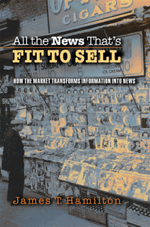 Facebook celebrates its fifth birthday today, having led a revolution in social media and shaken up journalism in the process. As a student at Harvard when Facebook launched here in February 2004, I claimed the 185th profile on the site, known then around campus as thefacebook.com — one word, as in, “You won’t believe who poked me on thefacebook.com!” I’m hoping that someday my low profile number will carry the cachet of an old “member since” date on an Amex card. But until then, I’ll just share a quick story about the early days of Facebook that bears on the intersection of journalism and social media.
Facebook celebrates its fifth birthday today, having led a revolution in social media and shaken up journalism in the process. As a student at Harvard when Facebook launched here in February 2004, I claimed the 185th profile on the site, known then around campus as thefacebook.com — one word, as in, “You won’t believe who poked me on thefacebook.com!” I’m hoping that someday my low profile number will carry the cachet of an old “member since” date on an Amex card. But until then, I’ll just share a quick story about the early days of Facebook that bears on the intersection of journalism and social media.
Mark Zuckerberg has added a wealth of features to Facebook in five years, but he has also taken a few away. There was an ill-fated foray into file-sharing and a course catalog that didn’t survive the site’s expansion. In the first few months, Facebook profiles also listed every mention of a user’s name in the archives of Harvard’s student newspaper The Crimson. It was a useful widget for keeping track of news in your friends’ lives, but Zuckerberg killed it not long after bringing Facebook to a few other universities.
There was no explanation for dropping the feature, and it could have been a problem with scalability, but this is what I think happened: Zuckerberg, who had initially played down the scope of his site, realized that Facebook wasn’t a tool for keeping track of news made somewhere else. It was a tool for making news right there, on Facebook.
 In the first chapter of this month’s Lab Book Club selection, economist James Hamilton defines information as “any description that can be stored in a binary (i.e., 0,1) format” and news as “the subset of information offered as news in the marketplace.” Zuckerberg had created a marketplace, though he did not charge an entrance fee, for data in high demand on a very local level: relationships, memberships, likes, dislikes, birthdays. His site transformed that information into news. It was the perfect model, perhaps, of a community or campus news organization that deals in the treasured minutiae of localized networks. And this was at least two years before Facebook’s news feed would give the concept its proper shape.
In the first chapter of this month’s Lab Book Club selection, economist James Hamilton defines information as “any description that can be stored in a binary (i.e., 0,1) format” and news as “the subset of information offered as news in the marketplace.” Zuckerberg had created a marketplace, though he did not charge an entrance fee, for data in high demand on a very local level: relationships, memberships, likes, dislikes, birthdays. His site transformed that information into news. It was the perfect model, perhaps, of a community or campus news organization that deals in the treasured minutiae of localized networks. And this was at least two years before Facebook’s news feed would give the concept its proper shape.
Such was the state of news on an American college campus in 2004. The student newspaper did its thing — very well, I’d argue — performing a valuable service for its community, one member of which coded a website in “literally…a week” that eclipsed the newspaper’s audience in less than a month. And soon enough, the website didn’t need the newspaper. It was a news organization unto itself.
Related: Facebook has posted some of its early site designs, and here’s a timeline of the site’s expansion, which doesn’t mention the time Zuckerberg compared his unattractive classmates to “farm animals” or tried to organize a nationwide Beirut tournament. On Twitter yesterday afternoon, I asked how Facebook had changed reporting and got two responses. Feel free to add your own thoughts on the five-year-old site’s relationship to journalism in the comments.